Range of associations to Russian abstract and concrete nouns
The article deals with the specificity of associations to nouns with a high degree of abstractness and concreteness. Nouns were selected from the created database of abstractness/concreteness ratings of the Russian language; associations were selected from the Russian associative dictionary of Yu.N. Karaulov. The research shows that firstly, verbal associations are one of the main mechanisms involved in language processing, and secondly, abstractness/concreteness plays a key role in generating associations. The paper provides a statistical analysis of 20-25 associations to 50 abstract and 50 concrete nouns, 10 most frequent associations to each word were analyzed in detail and classified into groups according to the type of relations with stimulus words, also each of the selected associations was analyzed for abstractness/concreteness degree using the created database, which allowed making important conclusions about the nature of the context in which the abstract and concrete lexemes occur. The analysis performed in the work allows to reveal the specificity of abstract and concrete nouns in terms of semantic structure of words, to reveal the facts of intersection of concrete and abstract meanings in the structure of the studied lexemes. Moreover, the study makes it possible to test the psycholinguistic theory of context availability on the material of the Russian language by statistical methods. The conclusions presented in the work, based on the linguistic material, correlate with the studies, in which neurobiological mechanisms of perception of concrete and abstract words are studied.
Figures
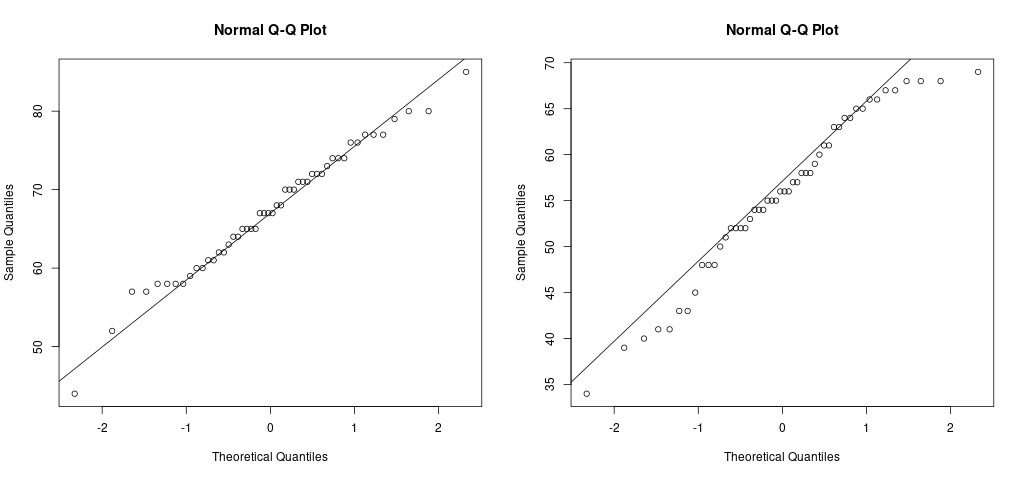
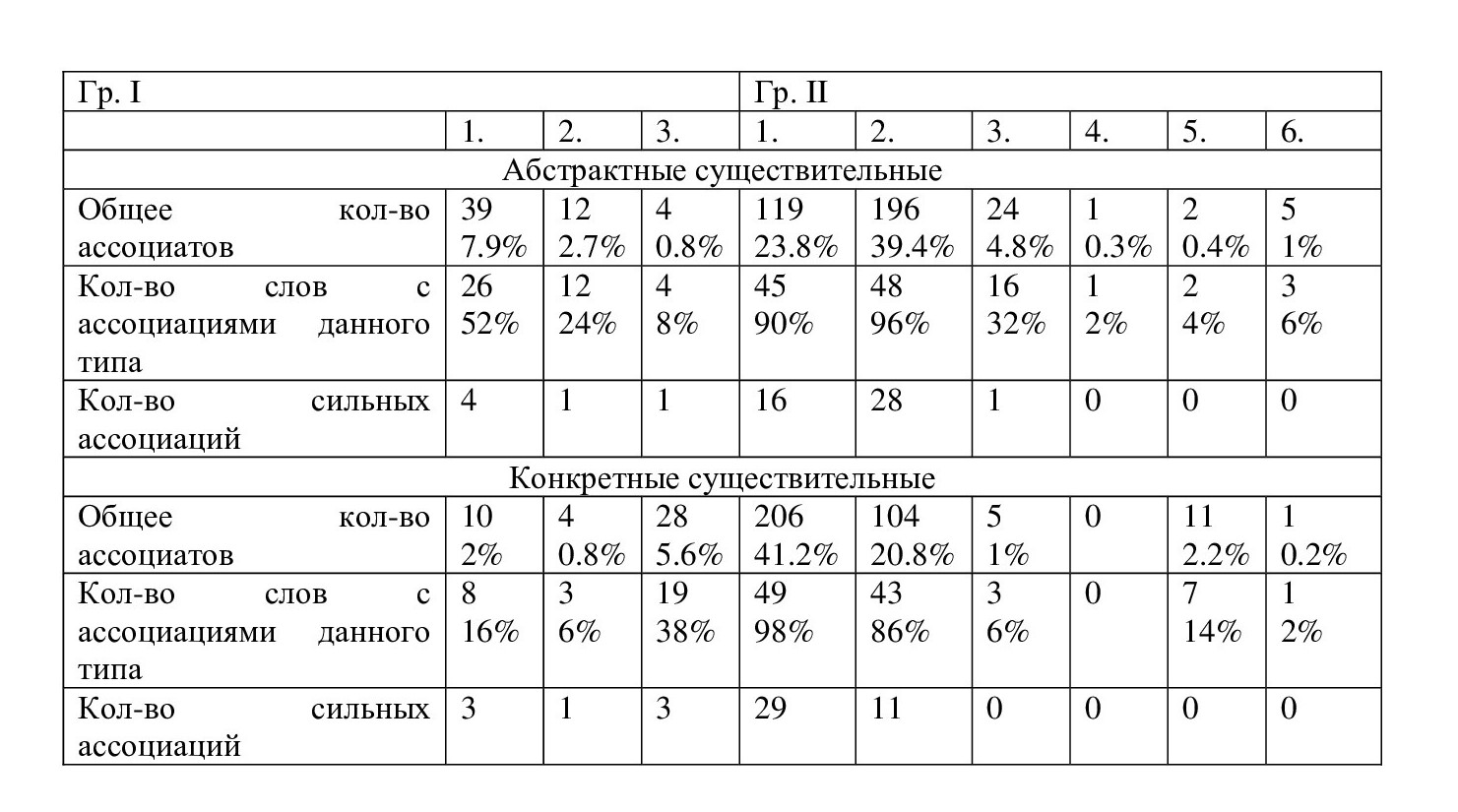
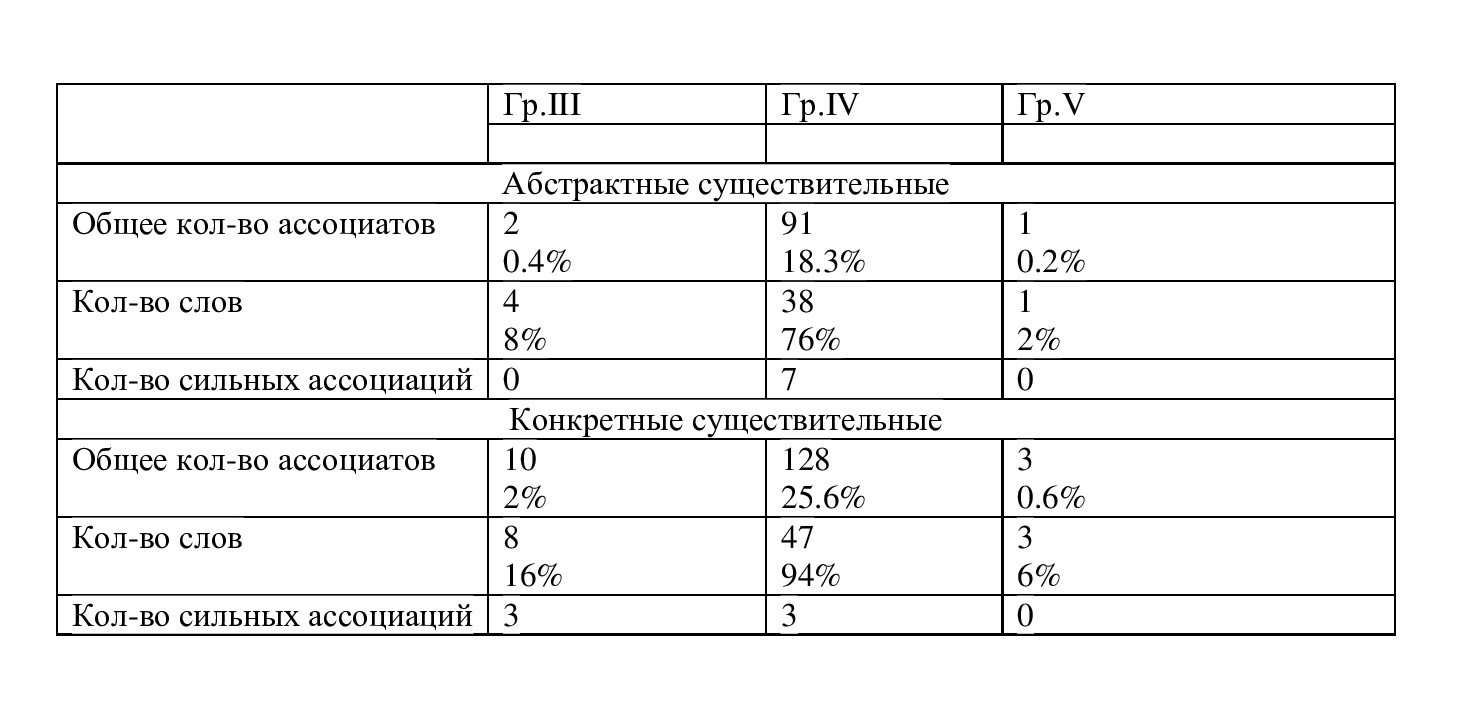
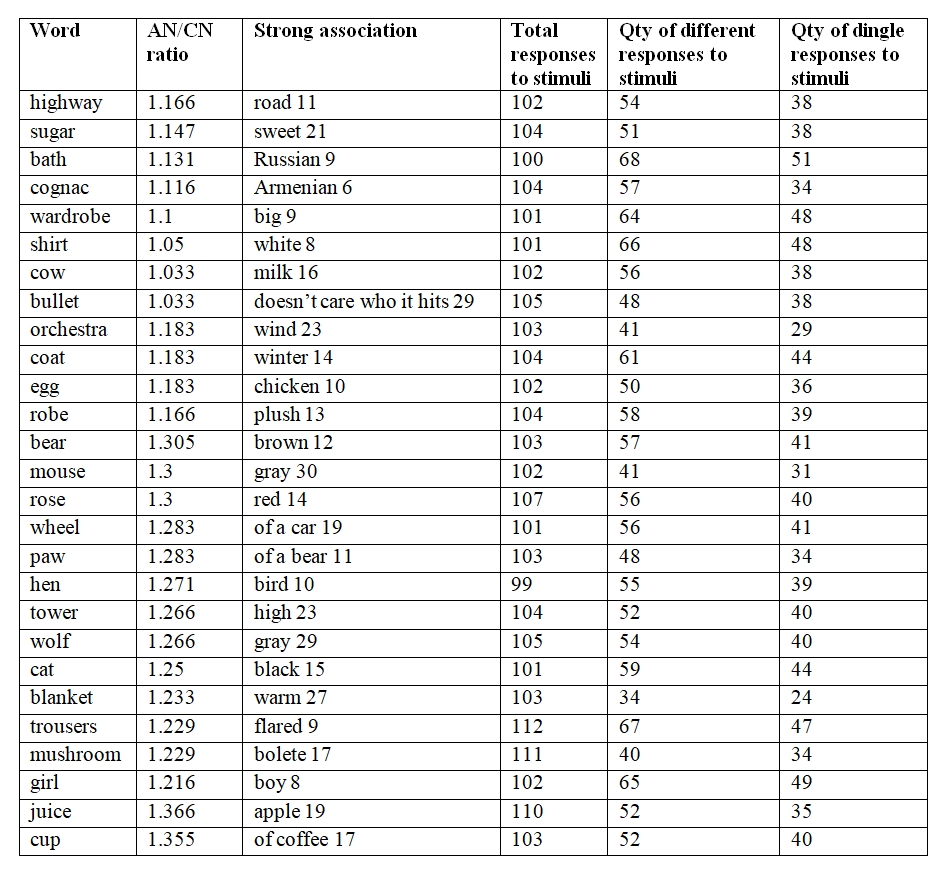
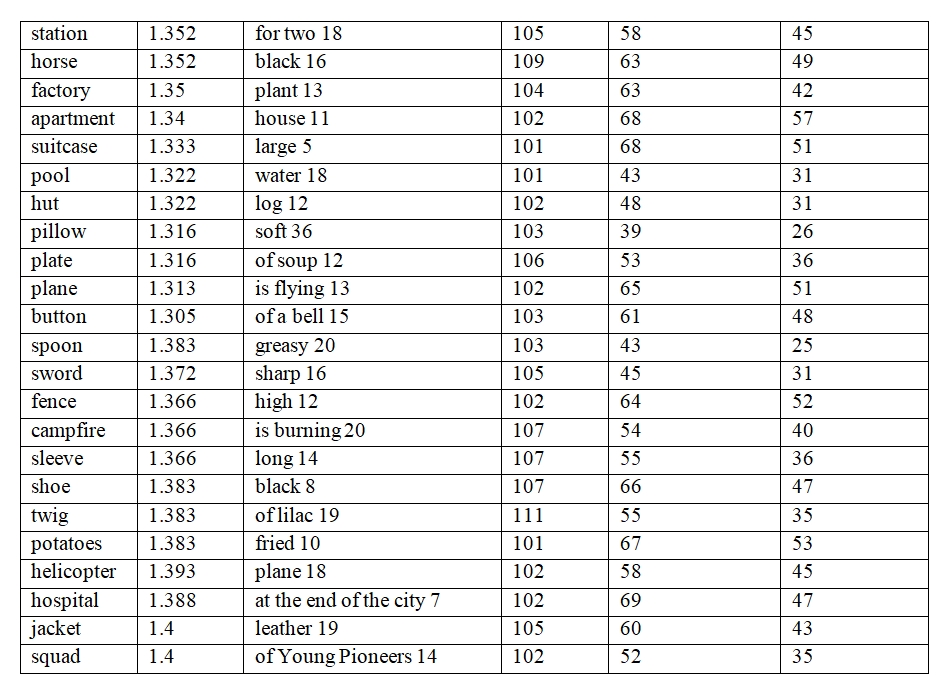
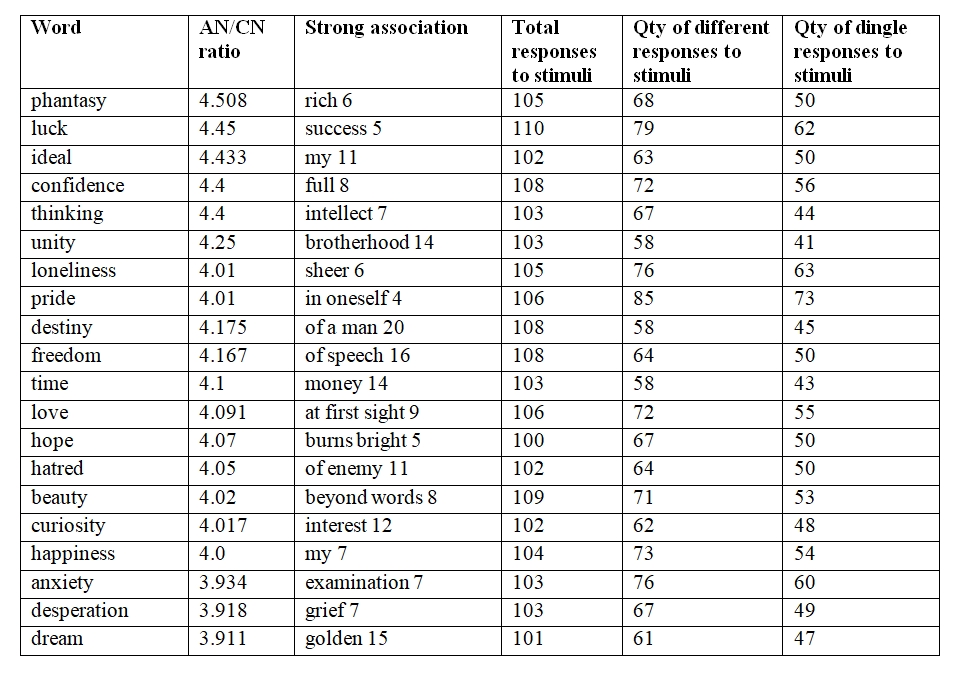
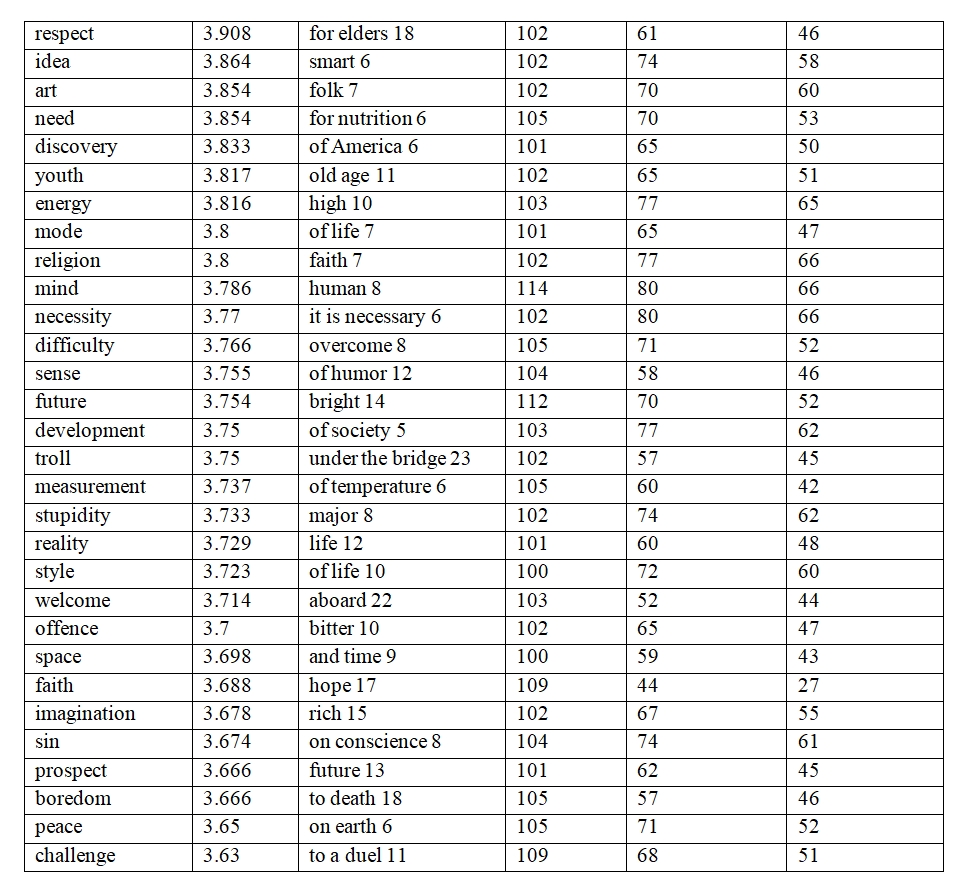
Solovyev, V. D., Vol’skaya, Y. A. and Akhtiamov, R. B. (2023). Range of associations to Russian abstract and concrete nouns, Research Result. Theoretical and Applied Linguistics, 9 (1), 153-173. DOI: 10.18413/2313-8912-2023-9-1-1-0


















While nobody left any comments to this publication.
You can be first.
Apresyan, Yu. D. (1995). Leksicheskaya semantika: 2-e izd., ispr. i dop. [Lexical semantics: 2nd ed., corrected. and additional], Izbrannye trudy: v 2 t. [Selected works: in 2 vols], Shkola «Yazyki russkoj kul'tury», Izdatel'skaya firma «Vostochnaya literatura» RAN, Moscow, Russia, V.2 (In Russian)
Bailey, D. J., Nessler, C., Berggren, K. N. and Wambaugh, J. L. (2020). An aphasia treatment for verbs with low concreteness: a pilot study, American Journal of Speech-Language Pathology, 29 (1), 299-318. http://dx.doi.org/10.1044/2019_AJSLP-18-0257(In English)
Barsalou, W. L. and Wiemer-Hastings, K. (2005). Situating Abstract Concepts, Grounding cognition: The role of perception and action in memory, language, and thought, Cambridge University Press, Cambridge, UK, 129–163. (In English)
Borghi, A. M., Binkofski, F., Castelfranchi, C., Cimatti, F., Scorolli, C. and Tummolini, L. (2017). The challenge of abstract concepts, Psychological Bulletin, 143, 263–292. http://dx.doi.org/10.1037/bul0000089(In English)
Brysbaert, M., Stevens, M., De Deyne, S. and Voorspoels, W. (2014b). Norms of age of acquisition and concreteness for 30,000 Dutch words, Acta psychologica, 150, 80–84. http://dx.doi.org/10.1016/j.actpsy.2014.04.010 (In English)
Brysbaert, M., Warriner, A. B. and Kuperman, V. (2014a). Concreteness ratings for 40 thousand generally known English word lemmas, Behavior research methods, 46 (3), 904–911. http://dx.doi.org/10.3758/s13428-013-0403-5(In English)
Chen, S. X., Benet-Martínez, V. and Ng, J. C. K. (2014). Does language affect personality perception? A functional approach to testing the Whorfian hypothesis, Journal of Personality, 82 (2), 130–143. http://dx.doi.org/10.1111/jopy.12040(In English)
Coltheart, M. (1981). The MRC psycholinguistic database, The Quarterly Journal of Experimental Psychology, 33, 497-505. http://dx.doi.org/10.1080/14640748108400805(In English)
Cousins Katheryn, A. Q., Ash, Sh., Irwin, D. J. and Grossman, M. (2017). Dissociable substrates underlie the production of abstract and concrete nouns, Brain and Language, 165, 45-54. http://dx.doi.org/10.1016/j.bandl.2016.11.003(In English)
Crutch, S. J. and Warrington, E. K. (2005). Abstract and concrete concepts have structurally different representational frameworks, Brain, 128 (3), 615–627. http://dx.doi.org/10.1093/brain/awh349 (In English)
Crutch, S. J. and Jackson, E. C. (2011). Contrasting graded effects of semantic similarity and association across the concreteness spectrum, Quarterly Journal of Experimental Psychology, 64 (7), 1388–1408. http://dx.doi.org/10.1080/17470218.2010.543285(In English)
De Deyne, S., Navarro, D. J., Perfors, A., Brysbaert, M. and Storms, G. (2019). The “Small World of Words” English word association norms for over 12,000 cue words, Behavior Research Methods, 51 (3), 987–1006. http://dx.doi.org/10.3758/s13428-018-1115-7 (In English)
De Deyne, S. and Storms, G. (2015). Word associations, in Taylor, J. R. (ed.), The Oxford handbook of the word, Oxford University Press, New York, US. (In English)
De Groot, A. M. (1989). Representational aspects of word imageability and word frequency as assessed through word association, Journal of Experimental Psychology: Learning, Memory, and Cognition, 15 (5), 824–845. http://dx.doi.org/10.1037/0278-7393.15.5.824(In English)
Duñabeitia, J. A., Avilés, A., Afonso, O., Scheepers, C. and Carreiras, M. (2009). Qualitative differences in the representation of abstract versus concrete words: evidence from the visual-world paradigm, Cognition, 110 (2), 284–292. http://dx.doi.org/10.1016/j.cognition.2008.11.012(In English)
Frassinelli, D., Naumann, D., Utt, J. and Schulte im Walde, S. (2017). Contextual Characteristics of Concrete and Abstract Words, IWCS 2017 – 12th International Conference on Computational Semantics. (In English)
Goldin, V. E. (2008). Configurations of associative fields and language picture of the world, Yazyk – soznanie – kul'tura – socium: sbornik dokladov i soobshchenij Mezhdunarodnoj nauchnoj konferencii pamyati professora I. N. Gorelova, Saratov, 147-152. (In Russian)
Hanley, J. R., Hunt, R. P., Steed, D. A. and Jackman, S. (2013). Concreteness and word production, Memory & Cognition, 41, 365-377. http://dx.doi.org/10.3758/s13421-012-0266-5(In English)
Hill, F., Korhonen, A. and Bentz, Ch. (2014). A Quantitative Empirical Analysis of the Abstractness/concreteness Distinction, Cognitive science, 38 (1), 162–177. http://dx.doi.org/10.1111/cogs.12076(In English)
Hoffman, P., Lambon Ralph, A. M., Rogers, T. T. (2013). Semantic Diversity: A Measure of Semantic Ambiguity Based on Variability in the Contextual Usage of Words, Behavior Research Methods, 45 (3), 718–730. http://dx.doi.org/10.3758/s13428-012-0278-x(In English)
Ivanov, V. and Solovyev, V. (2022). Automatic generation of a large dictionary with concreteness/abstractness ratings based on a small human dictionary, Journal of Intelligent & Fuzzy Systems, Preprint, 42 (5), 4513-4521. http://dx.doi.org/10.48550/arXiv.2206.06200(InEnglish)
Karaulov, Yu. N. (1994). Russkij associativnyj slovar' kak novyj lingvisticheskij istochnik i instrument analiza yazykovoj sposobnosti [Russian Associative Dictionary as a New Linguistic Source and Tool for the Analysis of Language Ability], in Karaulov, Yu. N., Sorokin, Yu. S., Tarasov, E. F., Ufimceva, N. V. and Cherkasova, G. A., Russkijassociativnyjslovar'. Kniga 1 [Russian associative dictionary. Book 1], Moscow, Russia, 191-218. (In Russian)
Kousta, S. T., Vigliocco, G., Vinson, D., Andrews, M. and Del Campo, E. (2011). The representation of abstract words: Why emotion matters, Journal of Experimental Psychology: General, 140, 14–34. http://dx.doi.org/10.1037/a0021446(In English)
Loiselle, M., Rouleau, I., Nguyen, D. K., Dubeau, F., Macoir, J., Whatmough, C. and Joubert, S. (2012). Comprehension of concrete and abstract words in patients with selective anterior temporal lobe resection and in patients with selective amygdalo-hippocampectomy, Neuropsychologia, 50, 630-673. http://dx.doi.org/10.1016/j.neuropsychologia.2011.12.023(In English)
Lupyan, G., Abdel Rahman, R., Boroditsky, L. and Clark, A. (2020). Effects of language on visual perception, Trends in Cognitive Sciences, 24 (11), 930–944. http://dx.doi.org/10.1016/j.tics.2020.08.005(In English)
Mate, J., Allen, R. J. and Baqués, J. (2012). What you say matters: Exploring visual–verbal interactions in visual working memory, The Quarterly Journal of Experimental Psychology, 65, 395-400. http://dx.doi.org/10.1080/17470218.2011.644798(In English)
McNamara, D., Graesser, C., Mccarthy, P. M. and Zhiqiang, C. (2012). Automated evaluation of text and discourse with Coh-Metrix, Cambridge University Press, Cambridge, UK. https://doi.org/10.1017/CBO9780511894664(In English)
Mestres-Missé, A., Münte, T. F. and Rodriguez-Fornells, A. (2014). Mapping concrete and ab-stract meanings to new words using verbal contexts, Second Language Research, 30, 191–223. http://dx.doi.org/10.1177/0267658313512668(In English)
Naumann, D., Frassinelli, D. and Schulte im Walde, S. (2018). Quantitative Semantic Variation in the Contexts of Concrete and Abstract Words, Proceedings of the Seventh Joint Conference on Lexical and Computational Semantics, 76–85. http://dx.doi.org/10.18653/v1/S18-2008(In English)
Nishiyama, R. (2013). Dissociative contributions of semantic and lexical-phonological information to immediate recognition, Journal of Experimental Psychology: Learning, Memory, and Cognition, 39, 642-648. http://dx.doi.org/10.1037/a0029160(In English)
Oliveira, J., Perea M. V., Ladera, V. and Gamito, P. (2013). The roles of word concreteness and cognitive load on interhemispheric processes of recognition, Laterality, 18 (2), 203-215. http://dx.doi.org/10.1080/1357650X.2011.649758(In English)
Paivio, A. (2013). Dual Coding Theory, Word Abstractness, and Emotion: A Critical Review of Kousta et al. (2011), Journal of Experimental Psychology: General, 142, 282-287. http://dx.doi.org/10.1037/a0027004(In English)
Paivio, A. (1986). Mental representations: A dual coding approach, Oxford University Press, New York, US. (In English)
Planchuelo, C., Buades-Sitjar, F., Hinojosa, J. A. and Duñabeitia, J. A. (2022). The nature of word associations in sentence contexts, Experimental Psychology, 69 (2), 104-110. http://dx.doi.org/10.1027/1618-3169/a00054(In English)
Pulvermüller, F. (2013). How neurons make meaning: Brain mechanisms for embodied and abstract-symbolic semantics, Trends in Cognitive Sciences, 17, 458-470. http://dx.doi.org/10.1016/j.tics.2013.06.004(In English)
Sadoski, M. (2001). Resolving the effects of concreteness on interest, comprehension, and learning important ideas from text, Educational Psychology Review, 13 (3), 263–281. http://dx.doi.org/10.1023/A:1016675822931(In English)
Sadoski, M., Kealy, W. A., Goetz, E. T. and Paivio, A. (1997). Concreteness and imagery effects in the written composition of definitions, Journal of Educational Psychology, 89 (3), 518–526. http://dx.doi.org/10.1037/0022-0663.89.3.518(In English)
Spiridonova, N. F. (2000). Language and perception: the semantics of qualitative adjectives, Ph.D. Thesis, Moscow, Russia. (In Russian)
Schock, J., Cortese, M. J. and Khanna, M. M. (2012). Imageability estimates for 3,000 disyllabic words, Behavior Research Methods, 44 (2), 374–379. http://dx.doi.org/10.3758/s13428-011-0162-0(In English)
Schwanenflugel, P. J., Akin, C. and Luh, W.-M. (1992). Context availability and the recall of ab-stract and concrete words, Memory & Cognition, 20, 96–104. http://dx.doi.org/10.3758/bf03208259(In English)
Shaposhnikova, I. V. (2022). Associative grammar and meaning (on the example of a noun), Sibirskij filologicheskij zhurnal, 1, 268-284. http://dx.doi.org/10.17223/18137083/78/19 (In Russian)
Solovyev, V. D., Ivanov, V. V. and Akhtiamov, R. B. (2019). Dictionary of Abstract and Concrete Words of the Russian Language: A Methodology for Creation and Application, Journal of Research in Applied Linguistics, 10, 215–227. http://dx.doi.org/10.22055/RALS.2019.14684(In English)
Solovyev, V. D., Volskaya, Y. A., Andreeva, M. I. and Zaikin, A. A. (2022). Russian dictionary with concreteness/abstractness indices, Russian Journal of Linguistics, 26 (2), 515–549. http://dx.doi.org/10.22363/2687-0088-29475(In English)
Solovyev, V., Solnyshkina, M., Andreeva, M., Danilov, A. and Zamaletdinov, R. (2020). Text Complexity and Abstractness: Tools for the Russian Language, Proceedings of the International Conference “Internet and Modern Society”, 75-87. (In English)
Spreen, O. and Schulz, R. W. (1966). Parameters of abstraction, meaningfulness, and pronunciability for 329 nouns, Journal of Verbal Learning and Verbal Behavior, 5, 459-468. http://dx.doi.org/10.1016/S0022-5371(66)80061-0(In English)
Vinogradov, V. V. (2001). Russkij yazyk (Grammaticheskoe uchenie o slove): 4-e izdanie [Russian language (Grammatical doctrine of the word): 4th edition], Russkij yazyk, Moscow, Russia. (In Russian)
Volskaya, Y. A., Zhuravkina, I. S. and Lobanov A. P. (2020). Dictionary of abstract the words of the Russian language: Nouns with high numerical measure of abstractness, International Journal of Criminology and Sociology, 9, 2398–2405. https://doi.org/10.6000/1929-4409.2020.09.290(In English)
Volskaya, Y. A. (2022). Sozdanie bazy dannyh abstraktnyh i konkretnyh sushchestvitel'nyh: vopros o vliyanii instrukcij na ocenku slov respondentami [Creating a database of abstract and concrete nouns: the question of the influence of instructions on the assessment of words by respondents], Philology and Culture, 4 (70), 36-43. http://dx.doi.org/10.26907/2782-4756-2022-70-4-36-43(In Russian)
Xu, X. and Li, J. (2020). Concreteness/abstractness ratings for two-character Chinese words in MELD-SCH, PLoS ONEО, 15 (6). http://dx.doi.org/10.1371/journal.pone.0232133(In English)
Zhuravkina, I., Soloviev, V., Lobanov, A. and Danilov, A. (2020). Comparative analysis of concreteness abstractness of Russian words, Conference of Open Innovation Association (FRUCT), 464–470. http://dx.doi.org/10.23919/FRUCT48808.2020.9087416(In English)
The reported study was funded by the Russian Foundation for Basic Research, Project Number 20-312-90041.